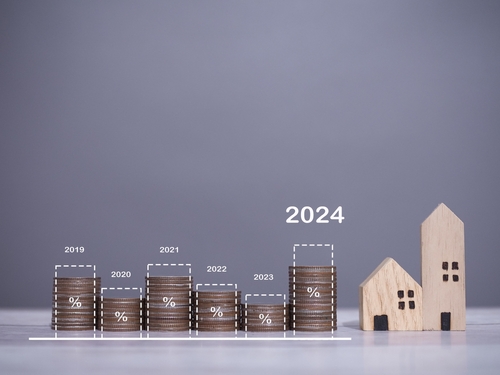Agents should be getting buyers to focus on what they can afford now and in the future rather than worrying about rising rates, an industry veteran claims.
Iain McKenzie, chief executive of The Guild of Property Professionals, has suggested that concerns about the impact of rising interest rates and the impact on the housing market are overstated.
It comes as the Bank of England is expected to raise the base rate this week, which could in turn push up mortgage pricing.
He highlights that since 1975, the base interest rate had not been below 4% until it dropped to 3.75% and then 3.5% in 2003, which was the lowest it has been in 28 years.
Before the global financial crisis, he said, interest rates went up to 5.75%, before they were dropped to 0.5% in 2009.
McKenzie said: “Inflation is at its highest level for over 30 years and the mechanism the Bank of England uses to try and curb and control it is the interest rate.
“High inflation causes many economy issues and at a rate of 10%, which is well over the 2% target, it needed to be addressed. If the Bank of England continues pushing up rates we could get to a point where a 5% mortgage rate is the norm, and that’s what agents should be telling buyers, it is the norm and not what they should be focusing on.”
He adds that when comparing historical interest rates and property transaction volumes, there is no evidence that suggests that there is a correlation between the two.
McKenzie added: “There were more mortgages approved when interest rates were at 15% than there were during the pandemic.
“The monthly repayments would be higher, but lenders will have an appetite to borrow, and people will continue to move. Rather than focusing on the rate, buyers should be focusing on what they can afford and the cost of the mortgage on a month-to-month basis.
“When looking to finance a car for example, buyers are more focused on their monthly repayments than the rates they are being charged, but often don’t apply the same rationale to buying a property.
“When looking to take out a mortgage, should affordability not be a key factor, and deciding whether they are prepared to pay the monthly cost? Other aspects they should be considering is if the cost is fixed and for how long. If it isn’t fixed, what could the cost be if the interest rates do go up and could they still afford to live in the property?”
McKenzie said the decision-making process will vary depending on whether the buyer is looking for a home or an investment, adding: “If an investor is looking for add to their buy-to-let portfolio, the return-on-investment will be at the heart of the decision, but for someone looking to buy a home to live in, the driving force behind their decision will be whether they want to live in the property for the next five to ten years.
“Property should always be seen as a medium to long term investment, especially when you consider that statistically every homeowner that has kept their property for a ten-year period would have seen an increase in the value of their property.
“Rather than focusing on rising interest rates, the question should be about whether the buyer can afford to purchase the property now and be able to afford it in the years to come.”









/_Kwasi%20Kwarteng_400x310.png)






.png)


.png)




Join the conversation
Be the first to comment (please use the comment box below)
Please login to comment